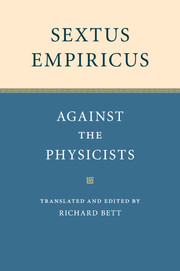Book 1
Published online by Cambridge University Press: 30 September 2021
Summary
INTRODUCTION TO THE ENTIRE WORK ( 1 – 1 2 )
Focus on principles (1–3)
[1] The reason why the physical part of philosophy is brought forward for our inquiry after the logical part, although it seems to come before the others in time, we mentioned above. And here we will again assemble the same method of investigation, not dwelling on the particulars, as Clitomachus and the rest of the chorus of Academics have done (for by jumping into alien material and creating their arguments on the basis of agreement with the dogmatic views of others they prolonged their counter-argument immensely), but attacking the most important and all-encompassing points – by means of which we shall have the rest put into impasse as well. [2] For just as in sieges those who undermine the foundation of the wall get the towers to come down along with it, so those in philosophical inquiries who have defeated the initial assumptions of a subject have in effect ruled out apprehension of the entire subject. [3] Indeed, some people not implausibly compare those who descend into particular investigations to hunters who pursue the animal on foot, or to those who fish with a line or who catch birds with lime and a twig, while they compare those who shake all the particulars by means of the most all-encompassing points to people who put lines, stakes and nets around them. Hence, just as it is much more skilful to be able to catch many in one go than to labor over every single catch, so it is much more elegant to bring a counter-argument jointly against everything than to be stuck with the particulars.
General distinction between active and material principles (4–12)
[4] So, since those who are thought to have done the more precise classification of the principles of everything say that some are active, others material (and the first to advance their opinion is held to be the poetHomer, and after himAnaxagoras ofClazomenae and Empedocles of Acragas and lots of others. [5] For the poet gives an account of these things when he allegorizes about Proteus and Eidothea, calling the first [prôton] and most original cause Proteus, and the being that is turned into specifics [eidê] Eidothea.
- Type
- Chapter
- Information
- Sextus EmpiricusAgainst the Physicists, pp. 3 - 80Publisher: Cambridge University PressPrint publication year: 2012

